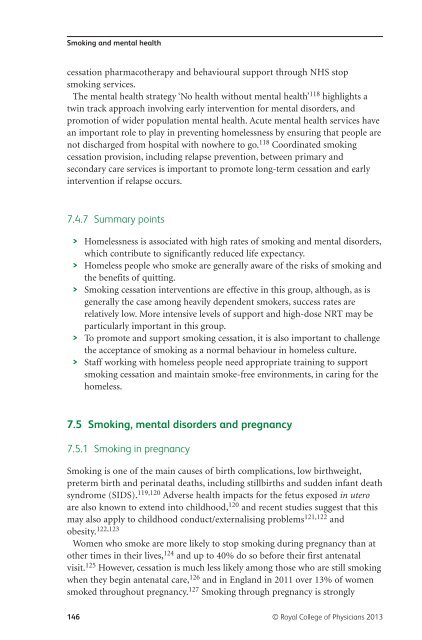Smoking and mental health - NCSCT
Smoking and mental health - NCSCT
Smoking and mental health - NCSCT
Create successful ePaper yourself
Turn your PDF publications into a flip-book with our unique Google optimized e-Paper software.
<strong>Smoking</strong> <strong>and</strong> <strong>mental</strong> <strong>health</strong><br />
cessation pharmacotherapy <strong>and</strong> behavioural support through NHS stop<br />
smoking services.<br />
The <strong>mental</strong> <strong>health</strong> strategy ‘No <strong>health</strong> without <strong>mental</strong> <strong>health</strong>’ 118 highlights a<br />
twin track approach involving early intervention for <strong>mental</strong> disorders, <strong>and</strong><br />
promotion of wider population <strong>mental</strong> <strong>health</strong>. Acute <strong>mental</strong> <strong>health</strong> services have<br />
an important role to play in preventing homelessness by ensuring that people are<br />
not discharged from hospital with nowhere to go. 118 Coordinated smoking<br />
cessation provision, including relapse prevention, between primary <strong>and</strong><br />
secondary care services is important to promote long-term cessation <strong>and</strong> early<br />
intervention if relapse occurs.<br />
7.4.7 Summary points<br />
> Homelessness is associated with high rates of smoking <strong>and</strong> <strong>mental</strong> disorders,<br />
which contribute to significantly reduced life expectancy.<br />
> Homeless people who smoke are generally aware of the risks of smoking <strong>and</strong><br />
the benefits of quitting.<br />
> <strong>Smoking</strong> cessation interventions are effective in this group, although, as is<br />
generally the case among heavily dependent smokers, success rates are<br />
relatively low. More intensive levels of support <strong>and</strong> high-dose NRT may be<br />
particularly important in this group.<br />
> To promote <strong>and</strong> support smoking cessation, it is also important to challenge<br />
the acceptance of smoking as a normal behaviour in homeless culture.<br />
> Staff working with homeless people need appropriate training to support<br />
smoking cessation <strong>and</strong> maintain smoke-free environments, in caring for the<br />
homeless.<br />
7.5 <strong>Smoking</strong>, <strong>mental</strong> disorders <strong>and</strong> pregnancy<br />
7.5.1 <strong>Smoking</strong> in pregnancy<br />
<strong>Smoking</strong> is one of the main causes of birth complications, low birthweight,<br />
preterm birth <strong>and</strong> perinatal deaths, including stillbirths <strong>and</strong> sudden infant death<br />
syndrome (SIDS). 119,120 Adverse <strong>health</strong> impacts for the fetus exposed in utero<br />
are also known to extend into childhood, 120 <strong>and</strong> recent studies suggest that this<br />
may also apply to childhood conduct/externalising problems 121,122 <strong>and</strong><br />
obesity. 122,123<br />
Women who smoke are more likely to stop smoking during pregnancy than at<br />
other times in their lives, 124 <strong>and</strong> up to 40% do so before their first antenatal<br />
visit. 125 However, cessation is much less likely among those who are still smoking<br />
when they begin antenatal care, 126 <strong>and</strong> in Engl<strong>and</strong> in 2011 over 13% of women<br />
smoked throughout pregnancy. 127 <strong>Smoking</strong> through pregnancy is strongly<br />
146 © Royal College of Physicians 2013














